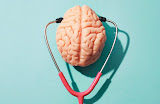Brain Health During the Pandemic
For the past 2 years most of world's population has been living in social isolation, uncertainty and fear concerning COVID-19. How does the novel environmental stimuli of prolonged lockdowns impact the health of the human brain? This study explores that issue,
A sample from the article:
While COVID-19 research has seen an explosion in the literature, the impact of pandemic-related societal and lifestyle disruptions on brain health among the uninfected remains underexplored. However, a global increase in the prevalence of fatigue, brain fog, depression and other “sickness behavior”-like symptoms implicates a possible dysregulation in neuroimmune mechanisms even among those never infected by the virus....
Healthy individuals examined after the enforcement of 2020 lockdown/stay-at-home measures demonstrated elevated brain levels of two independent neuroinflammatory markers (the 18 kDa translocator protein, TSPO, and myoinositol) compared to pre-lockdown subjects. The serum levels of two inflammatory markers (interleukin-16 and monocyte chemoattractant protein-1) were also elevated, although these effects did not reach statistical significance after correcting for multiple comparisons. Subjects endorsing higher symptom burden showed higher TSPO signal in the hippocampus (mood alteration, mental fatigue), intraparietal sulcus and precuneus (physical fatigue), compared to those reporting little/no symptoms. Post-lockdown TSPO signal changes were spatially aligned with the constitutive expression of several genes involved in immune/neuroimmune functions....
Collectively, these findings provide support to neuroimmune responses as mechanisms underlying stress, depression and other symptoms of psychological distress (Calcia et al., 2016, DiSabato et al., 2020). Further, the regional variability in increased [11C]PBR28 signal could be predicted by constitutive expression of genes related to glial neuroimmune response in healthy post-mortem human brains. Overall, our results indicate a possible link between pandemic-associated stressors and neuroimmune responses.
Cheers,
Colin







